 Petzlover
Petzlover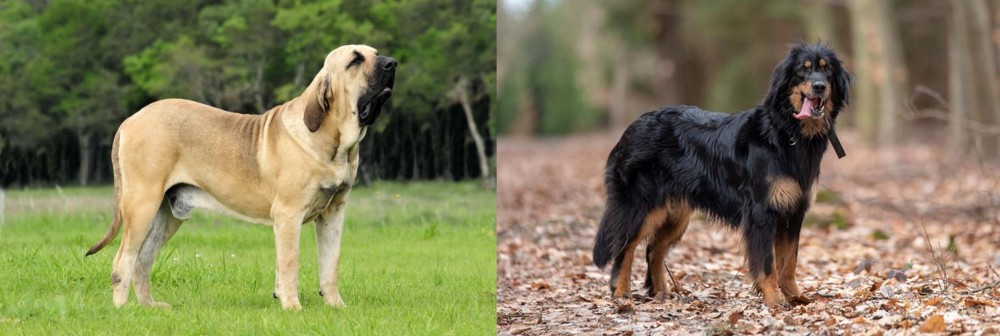 Fila Brasileiro is originated from Brazil but Hovawart is originated from Germany. Both Fila Brasileiro and Hovawart are having almost same height. Fila Brasileiro may weigh 29 kg / 64 pounds more than Hovawart. Both Fila Brasileiro and Hovawart has almost same life span. Both Fila Brasileiro and Hovawart has almost same litter size. Fila Brasileiro requires Moderate Maintenance. But Hovawart requires Low Maintenance
Fila Brasileiro is originated from Brazil but Hovawart is originated from Germany. Both Fila Brasileiro and Hovawart are having almost same height. Fila Brasileiro may weigh 29 kg / 64 pounds more than Hovawart. Both Fila Brasileiro and Hovawart has almost same life span. Both Fila Brasileiro and Hovawart has almost same litter size. Fila Brasileiro requires Moderate Maintenance. But Hovawart requires Low Maintenance
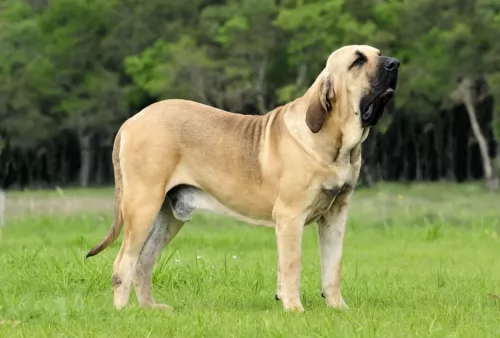 Hailing from Brazil, and known also as the Brazilian Mastiff, nobody seems to be too sure of the exact origins of the large Fila Brasileiro but it is believed to be a cross between the English Mastiff, the Bulldog and the Bloodhound.
Hailing from Brazil, and known also as the Brazilian Mastiff, nobody seems to be too sure of the exact origins of the large Fila Brasileiro but it is believed to be a cross between the English Mastiff, the Bulldog and the Bloodhound.
Other theories are that the dog comes from a mix of Portuguese and Spanish dogs and that they were bred to guard livestock from predators. Breeds that have no doubt contributed to the modern Fila are the Bullenbeisser, the Bloodhound, Mastiff and Rafeiro do Alentejo. All these dogs have characteristics such as excellent working dog skills, herding instincts as well as courage and tenacity.
The official Brazilian breed standard of the Fila was developed in the 1960s and the Fila Brasileiro Club of America was formed in 1984.
 The Hovawart, is a German Black Forest breed developed as a guard dog for large estates in the medieval era. They first appeared in history in the early 13th century as heroes who saved the German son of a castle lord, despite being injured themselves. The boy they saved grew up to be a German legend. He wrote the oldest German code of law that remained from medieval times. In it he names the Hovawarts as a dog that if you are responsible for hurting, stealing or killing it, you must pay for it or replace it. No other dog had this protection.
The Hovawart, is a German Black Forest breed developed as a guard dog for large estates in the medieval era. They first appeared in history in the early 13th century as heroes who saved the German son of a castle lord, despite being injured themselves. The boy they saved grew up to be a German legend. He wrote the oldest German code of law that remained from medieval times. In it he names the Hovawarts as a dog that if you are responsible for hurting, stealing or killing it, you must pay for it or replace it. No other dog had this protection.
In the late fifteenth century Hovawarts were featured in Heinrich Mynsinger’s “The Five Noble Breeds”. This guard dog breed was esteemed on a level with the hunting dogs – their health a question of life or death for their owner. In the 1500’s the popularity of the breed began to fade. The GSD or German Shepard Dog began to replace the Hovawarts as the preferred guard dog.
By the early 20th century the breed had almost disappeared but were saved by breed enthusiasts in the early 1900’s. Zoologist Kurt Konig was prominent in this effort and went looking in the Black Forest area for dogs working on farms. Using the dogs, he found on these farms, Konig began a breeding program crossing the them with Newfoundland’s, Kuvazoks, Leonbergers, GSD, an African hunting dogs and Bernese Mountain Dogs.
By 1922 the first litter of these pups was entered officially into the German Breeding Registry. In 1937 the Hovawart was recognized by the German Kennel Club. However, many members of the breed died in World War II as they were used widely by the military and not many were left by 1945. Once again breed enthusiasts came to the rescue forming a Coburg Hovawart club. This club still exists and in 1964, for the second time, the breed was recognized by the German Kennel Club. Other countries also began to take notice of this working breed.
The Hovawart has many skills in addition hunting and guarding. The Hovawart does not work for people, he works with them as he is a very independent thinker. He is also good at search and rescue and tracking. An owner of this breed must be stronger, smarter, more alert, intentional and consistent than his Hovawart. These are not dogs for the faint of heart or first-timers.
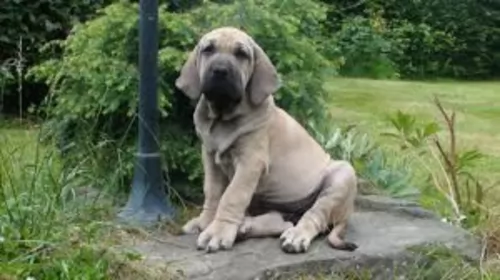 With his huge head covered in loose skin much like that of a Blooohound, and a body resembling that of a Mastiff, the large heavily built Fila Brasileiro is a mastiff breed from Brazil. He stands at 60 to 75cm in height and he weighs roughly 55 to 80kg.
With his huge head covered in loose skin much like that of a Blooohound, and a body resembling that of a Mastiff, the large heavily built Fila Brasileiro is a mastiff breed from Brazil. He stands at 60 to 75cm in height and he weighs roughly 55 to 80kg.
The ears of the Fila are large and droop down or are folded back, depending on his mood. The tail is long and slim. The coat of the dog is short and dense with the texture being quite smooth and soft. Colours of the coat can vary from solid fawn or black to red to brindle.
Perhaps the huge Fila wouldn’t be a good choice as a pet for the first-time inexperienced dog owner as he is a powerful, intelligent, self-assured, headstrong animal that will certainly need to have training and socialization if you want him as an obedient pet in your home.
He is a dog known for his courage and bravery. The Fila is loving and affectionate with his human family, being protective of them and not being too friendly with strangers. He isn't a particularly good pet choice with children in the home.
Some people, after buying a cute Fila puppy, put him out in the yard when he becomes large, and then they pretty much neglect him. This is cruel and irresponsible as he is a social, playful dog who wants to be part of his human family.
These dogs have some aggression in them and this makes them good watchdogs. They generally don’t show aggression towards their family but may snap at a stranger who tries to touch as he feels threatened.
 The Hovawart is a proud and majestic dog and his looks match his character. He looks a bit like the Golden Retriever with a powerful and broad forehead. His skull and muzzle are the same length and his nose is black. His oval eyes are a medium to dark brown and his ears are high set and triangular.
The Hovawart is a proud and majestic dog and his looks match his character. He looks a bit like the Golden Retriever with a powerful and broad forehead. His skull and muzzle are the same length and his nose is black. His oval eyes are a medium to dark brown and his ears are high set and triangular.
Their chests are strong, broad and deep. The breed has strong legs straight in front with round, strong and compact feet. They are heavy boned with dense, long coats that lie flat and have a slight wave to them. The coat can be black and gold, blond or black.
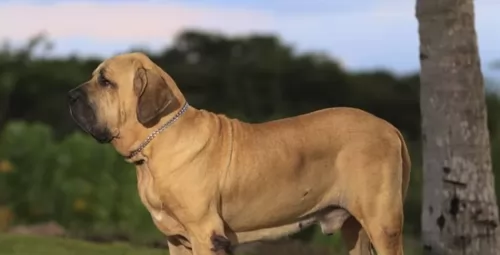 The Fila Brasileiro or Brazilian Mastiff is a powerful dog and it is believed that a large dog like this can be a danger to people if he isn’t trained and socialized.
The Fila Brasileiro or Brazilian Mastiff is a powerful dog and it is believed that a large dog like this can be a danger to people if he isn’t trained and socialized.
He is therefore not recommended for first time dog owners or homes with small children. He is a dog that is particularly wary of strangers too.
When he has been properly socialized he can be loving, loyal and obedient because it is essentially how a dog is brought up as to how he turns out.
If you bring one of these big, beautiful dogs into your home, have him socialized as a puppy, treat him firmly, but kindly and you could have yourself an extraordinary pet.
 They have a great sense of smell and a well-balanced personality.
They have a great sense of smell and a well-balanced personality.
They are not indoor dogs and should have a yard to run in. They do not tolerate hot weather well. They do great out in the country.
They are intelligent independent thinkers. They lengths well with positive reinforcement.
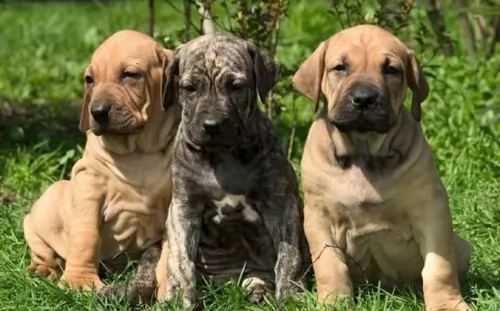 Filas are a dog breed who have a high rate of hip- and elbow dysplasia. This is a serious disease which can lead to lameness with your pet. Other orthopedic diseases with the breed include osteochondritis and luxating patella.
Filas are a dog breed who have a high rate of hip- and elbow dysplasia. This is a serious disease which can lead to lameness with your pet. Other orthopedic diseases with the breed include osteochondritis and luxating patella.
Also, as a deep-chested dog breed, your Fila also is at risk of getting the very serious gastrointestinal syndrome known as bloat. This is a common condition that can prove deadly for your pet. The Fila’s stomach will fill with gas, putting pressure on other organs and stopping blood flow to the heart and difficulty with breathing. Sometimes the stomach will twist. Get him to the vet immediately if you notice a swollen stomach, drooling or restless behaviour.
 Though their isolation protected them from genetic health issues for centuries, once they were being rejuvenated and mixed with other breeds some common issues began to show up. These include:
Though their isolation protected them from genetic health issues for centuries, once they were being rejuvenated and mixed with other breeds some common issues began to show up. These include:
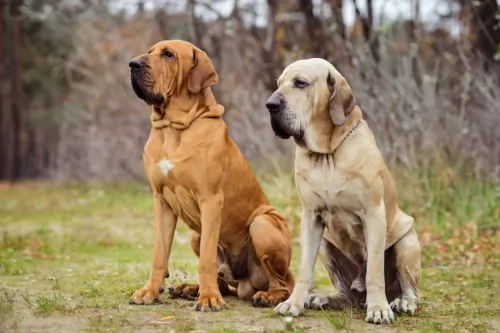 The Filas size makes it important that he have a good amount of exercise if you want to maintain his health and happiness. He isn’t a dog suited to city life as he is too large and will irritate his owners when cooped up in a tiny space with them. He isn’t demanding when it comes to exercise and activities all the time, but he should still be exercised regularly as he is inclined to become lazy .
The Filas size makes it important that he have a good amount of exercise if you want to maintain his health and happiness. He isn’t a dog suited to city life as he is too large and will irritate his owners when cooped up in a tiny space with them. He isn’t demanding when it comes to exercise and activities all the time, but he should still be exercised regularly as he is inclined to become lazy .
Moderate shedding. Regular brushing twice a week will be required. Check ears for infection and brush his teeth 2 or 3 times a week.
Nothing is set in stone as to what to feed your Fila Brasileiro, but a large dog will require quality food with a good amount of protein and fat according to size, age and activity levels.
Because a large breed dog is prone to hip dysplasia, look out for ingredients such as chondroitin and gludosamine which are specifically good for joint health. Try and avoid commercially manufactured food with common allergens such as soy, corn and wheat, artifical flavors and fillers.
A source of cooked rice, chicken and vegetables as well as some raw meat will be excellent for your big pet. Make sure he is never deprived of fresh, cool drinking water.
 Feed breed specific high quality dry food for puppies. Feed 1-2 cups in 3-4 meals per day
Feed breed specific high quality dry food for puppies. Feed 1-2 cups in 3-4 meals per day
Again Feed breed specific high quality dry food for adults. Feed 2-3 cups per day in 1-2 meals per day.
Points for Good Health – Stamina
The Hovawart needs plenty of exercise. Remember this is a mountain farm dog used to working all the time. Walk or jog with them daily. They can excel at field trials, obedience, search and rescue, agility, flyball, therapy dog, and service dog.